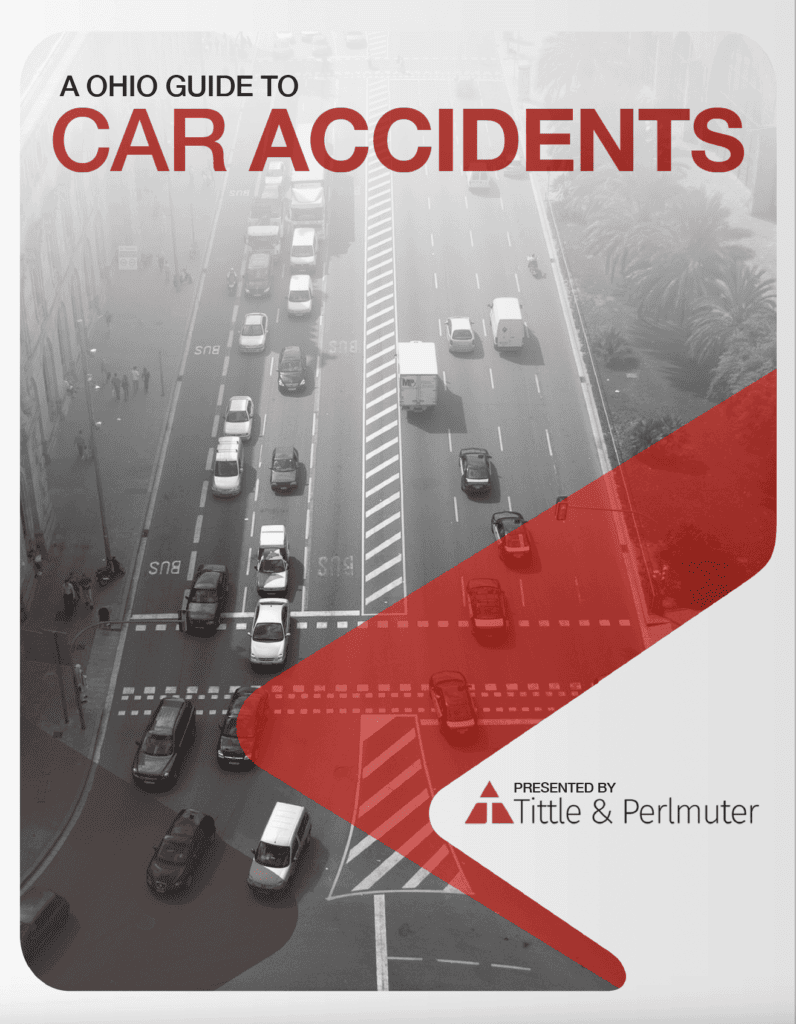Ohio Car Accident Lawyers
Turn 2 Tittle & Perlmuter and Start Recovering Now
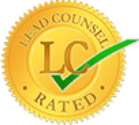



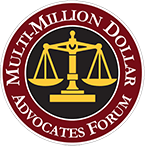



We Help Car Accident Survivors Every Day.
It's What We Do.
If you or a loved one have suffered catastrophic injuries from a car crash, we will help you recover both physically and financially, and fight tooth and nail to get you the compensation you deserve.
We have recovered millions of dollars for victims of auto accidents, and helped them get back on their feet. If you are lost in your auto accident claim, Turn 2 Tittle & Perlmuter and let us make your life easier.
We operate on a Contingency Fee Basis, meaning you only pay if we win. Call now, or fill out the form to the right to schedule a Free Strategy Session.
Car Accident Case Results
Real Results from Real Car Accident Survivors.
$1,150,000 SETTLEMENT | Wrongful Death in Motor Vehicle Crash
Our client was tragically killed at the age of 50 in a head-on collision with a delivery truck when the driver of the truck fell asleep at the wheel. Tittle & Perlmuter was able to recover in excess of the trucking company’s policy limits by successfully pursuing strenuously disputed vicarious liability claims against a separate entity that established the driver’s routes.
CONFIDENTIAL SIX-FIGURE SETTLEMENT | Car Accident Case
Our client suffered significant post-concussive issues, including cognitive impairment and depression, after a mild traumatic brain injury that they sustained in a car crash.
SIX-FIGURE SETTLEMENTS | Two Car Accident Victims
Our clients were the driver and passenger in a T-bone accident, where the other driver ran a stop sign and plowed into the passenger’s side of their vehicle at a high rate of speed. The driver and passenger sustained a fractured shoulder and fractured ribs, respectively, and each of their cases were settled before suit was filed in the six-figures.
SIX-FIGURE SETTLEMENT | Motor Vehicle Accident Case
In this case, the accident resulted in our client facturing their pelvis and knee cap. Our client, a traveling nurse, was traveling down a country road when the distracted driver ran a stop sign and slammed into her – the damage to the vehicle was so severe her car was completely totaled. EMS arrived on the scene and transferred our client to a small hospital who immediately shipped her to a trauma hospital in downtown Cleveland.
SIX-FIGURE SETTLEMENT | Car Accident Case
Our client was T-boned by a truck which ran a red light while exiting an off-ramp coming off the highway. The client sustained a fractured femur, which required surgery and an extended hospitalization.
$75,000 VERDICT | Motor Vehicle Accident Case
Our client was rear ended while waiting for a stoplight. Although the damage on both vehicles was minor, the impact caused our client’s head and neck to whip back and forth (whiplash). After suffering for some time and sporadic doctor’s appointment that did not provide relief, the client eventually received a MRI, which demonstrated a disc bulge. Despite objective evidence of an injury, the insurance company refused to believe our client and only offered $2,500.00 to settle the case.
The Most Important Steps to Take Following a Car Wreck
We'll Make Sure Million-Dollar Insurance Companies Won't Take Advantage of You.
How Can Tittle & Perlmuter Help Victims of Car Wrecks?
Your Insurance Company Doesn't Have Your Back — We Will.
It is important that you contact a lawyer as soon as possible after a car accident. The right attorneys can help get you a fair settlement for the damages and pain you experience from the car wreck, and get your life back. When our personal injury team takes on a case, we jump in headfirst and immediately conduct a thorough investigation of each car accident to ensure no evidence is lost or destroyed. The types of evidence we gather include police reports, photos taken at the scene of the accident, witness statements, data recorder information, phone records, manufacturer and recall information, as well as medical and work records. We look at all of the evidence and determine:
- Who caused the accident?
- Which driver was liable for the accident?
- Are there any witnesses to the accident?
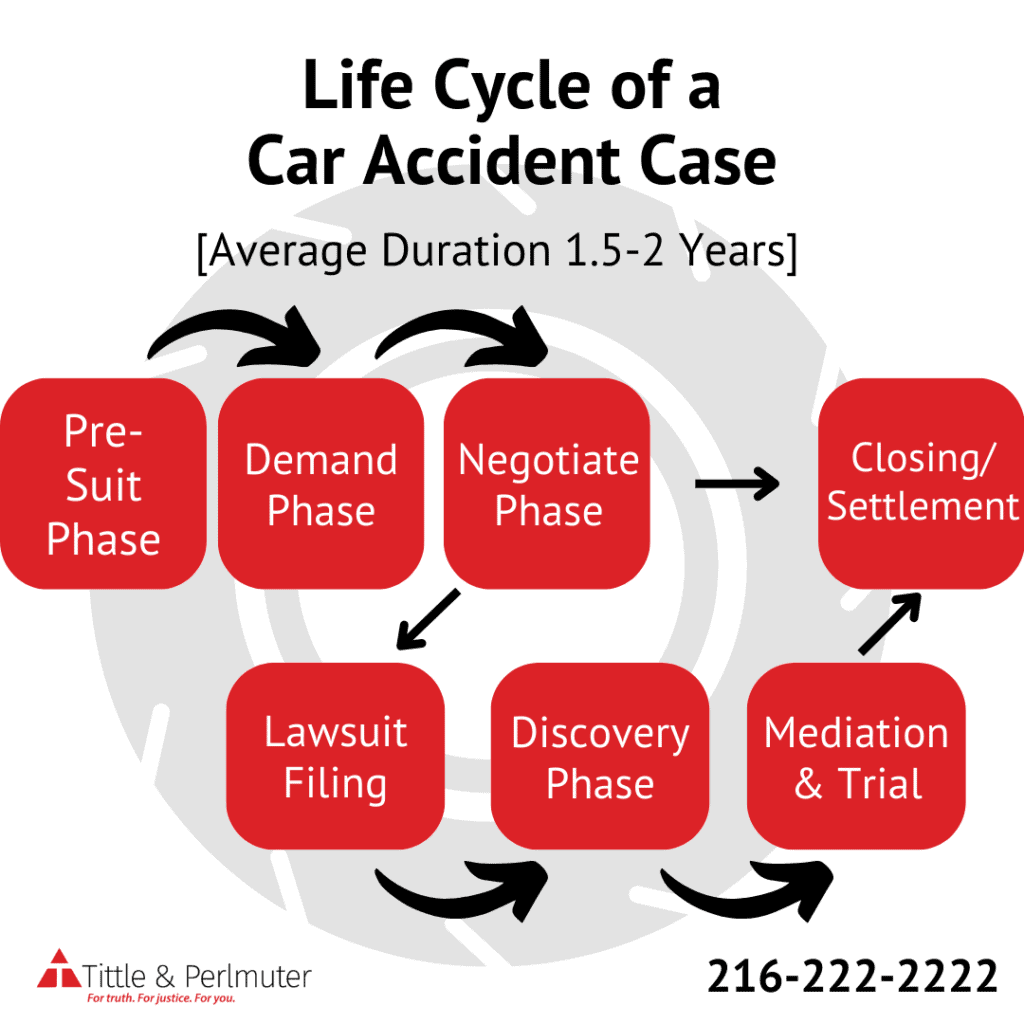
When Should I Contact an Attorney?
Avoid Insurance Traps from the Beginning of Your Claim.
You should go to the hospital right after a car accident and take care of any injuries you sustained in the crash. Then you should contact a local personal injury lawyer to discuss your legal options moving forward, especially if you were not at fault for the accident. If there is any indication that the driver found at fault was negligent, then you should seek legal advice.
Common Catastrophic Car Crash Injuries
Decades of Experience Getting Results for Car Accident Survivors.
Many times people are lucky and their car accident is a fender-bender and no major injuries are sustained. However, when a car crash is serious, there can be life-changing consequences. Injuries that lawyers frequently see as a result of a car accident include:
- Herniated or bulging discs
- Broken bones or fractures
- Traumatic Brain Injuries
- Spinal Cord Injuries
- Severe Burns
- Paralysis
- Amputations
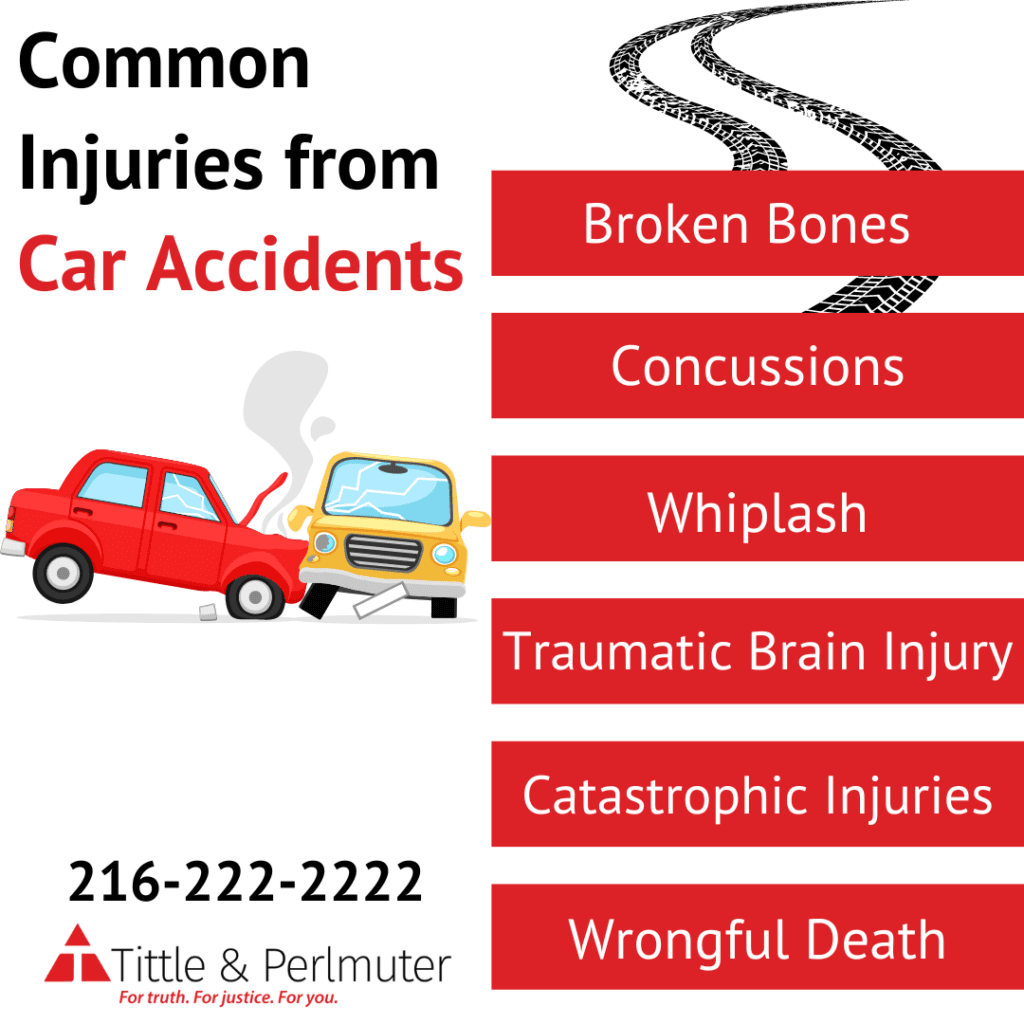
Has your life been upended by a car crash? Any of these injuries require immediate medical attention from a medical specialist. Next, contact a car accident attorney to ensure you receive the compensation you deserve for the recoverable damages you endured from your car crash.
Why Do I Need a Lawyer?
Take the Right Steps with an Expert by Your Side.

There is nothing stopping you from handling a car accident on your own with your insurance company, as well as the other driver’s insurance company. However, an important reason for hiring a car crash attorney is because they can help negotiate settlements with insurance companies, negotiate any potential subrogation claims with your own health insurance company, and/or a file personal injury lawsuit on your behalf, as well as go to court if needed. In short, they help you maximize your claim, and make sure you don’t have debt due to the at-fault’s negligence. Get the next steps to your claim and reach out to our team.
After an accident, the insurance company is not fighting for you, they are doing what is best for themselves. Their main focus is to get you to agree to a small settlement quickly. Right after an accident, it might seem great to get a few hundred or thousand dollars right away to help with any immediate bills. However, this is not the best solution for the long term. You may experience additional medical expenses and unpaid leave from work down the road. An insurance company doesn’t care that you have multiple medical bills after your auto crash, or you’re experiencing lost wages because you haven’t been able to return to work; but our attorneys care. Hire our team to fight for you.
Why Shouldn’t I Give a Statement to the Insurance Company After a Car Accident?
Insurance Companies Could Try to Twist Your Words.
The reason it is crucial to speak to a reputable attorney after a car accident and before giving a statement to the at-fault person’s insurance company is that you do not want to say anything that could be misconstrued.
Insurance companies will try to find reasons to believe that you aren’t as badly hurt as you say you are, in order to give a lower settlement. A Cleveland car accident attorney will be able to guide you on how to convey to the insurance company the full extent of your injuries and expenses that are a direct result of the crash.
It is also essential to keep all documentation of the expenses you’ve incurred, such as medical bills, vehicle repair bills, etc. You should also adhere to what your doctor suggests for the best plan of treatment for your recovery. Take the medication they prescribe, complete any additional testing they order, and make sure you go to any follow-up appointments you have set up. Insurance companies could interpret that the reason you’re ignoring your doctor’s instructions is because your injuries aren’t catastrophic.
How Do Insurance Companies Act in Bad Faith?
Get an Ally to Fight the Trillion Dollar Insurance Industry.
An attorney can also stand up to the insurance company if they are acting in bad faith. In other words, the insurance company may be trying to find a way to escape their obligation to pay you the amount you deserve for your claim. Under Ohio law, if you are making an uninsured or underinsured motor vehicle claim under your own policy, your insurance company is required to act in good faith.
Examples of bad faith from insurance companies include:
- Denying coverage you pay for on your insurance plan
- Refusing to pay your claim without first having done an investigation of the accident
- Not paying your claim in a timely manner
- Denying your claim without any explanation as to why
A lawyer who has experience handling car crash claims is going to do everything in their power so you receive justice for the monetary and physical damages you’ve incurred. An insurance company will not look out for you like an attorney will. At Tittle & Perlmuter, we are our client’s biggest allies. Fight the insurance company and call our team today.
Car Accident Frequently Asked Questions
The Answers You Need to Guide You Through Your Car Accident Claim.
No, you do not have to accept an insurance settlement and it is recommended that you call a lawyer to explore your options and get legal advice before accepting any settlements or signing any papers.
You can file a lawsuit for up to two years after the date of the accident, with some exceptions.
Insurance companies are trained to try and settle claims as quickly as possible and for the least amount of money possible. They may also try to find ways to escape their obligation to pay you the amount you deserve for your claim.
Generally speaking, personal injury settlements are non-taxable. However, some portions of the settlement may be taxable if there is a lost wage component. It is important to discuss any personal injury settlement with a tax professional.
If you are not injured, you do not have a personal injury case. However, we suggest that you confirm that you did not suffer any injuries as a result of the crash by seeing your primary care physician.
Call the police so a police report is made and an investigation is carried out to determine who is at-fault. Then, make sure you have the insurance information of the at-fault driver. If you are injured, get medical help immediately. Lastly, before you talk to the insurance company or sign any papers, make sure to call a lawyer to discuss your options. Insurance companies are trained to try and settle these claims quick and for the least amount possible.
Under Ohio Revised Code §2305.10 (A), you must bring your personal injury claim within two years from the date you were injured, with some exceptions.
The value of a personal injury case is assessed on a case-by-case basis. The settlement is dependent upon the severity of physical and economic damages.
Generally, your medical bills should be paid by your health insurance carrier. For copays or payments of medical bills not covered by your health insurance, at times, you are able to use your own medical payment coverage under your own car insurance. However, your own health insurance should be billed first.
You should hire an attorney that will give you a no-fee promise – meaning, the only way that an attorney fee will be charged is if the recovery is made. Then, the attorney will get a specified percent of the recovery proceeds, so you do not have to pay out of pocket.
A personal injury attorney can help negotiate settlements with insurance companies, negotiate subrogation claims with your health insurance company, file a personal injury lawsuit on your behalf, and go to court if needed.
After an accident occurs, it is very important to call the police so that a police report is made and an independent investigation is done to determine who is at-fault for the crash. However, whoever does not follow the rules of the road will be deemed at-fault for the crash.
Get the Compensation You Need to Move Forward
Don't Let a Car Accident Set You Back both Physically and Financially.
OR
Car Accident Client Testimonials
The Tittle & Perlmuter Difference.
DiAnn
Former Car Accident Client
“The attorney seemed very knowledgeable and willing to do what was necessary to get the matter settled. Tittle & Perlmuter was very communicative, very upfront and honest.”
Kaylee
Former Car Accident Client
“I was in a car accident. The insurance company only offered $2,500 to settle my car case. Attorney Allen Tittle took the matter to trial, and after four days, obtained a jury verdict of $75,000 which is 30 times more than what I was offered. He fights for his clients and obtains justice. I would highly recommend him.”
Dawn
Car Accident Client
“Always up front and explained everything.”
Lisa
Former Car Accident Client
“I would give this team 10 stars if I could! I was injured in a car wreck and reached out to them (word of mouth from another client). They were empathetic, attentive, and efficient. They navigated the process for me and literally took care of everything! The settlement was more than fair, actually more than I anticipated. Mary was an absolute rock star, advocating for me every step of the way. I never had to fight for information, she was in regular contact with me, even when there was nothing new to report.
Don’t hesitate to use this practice, they are the best.”
Kay Lexi
Former Car Accident Client
“I LOVE this firm! Tittle & Perlmuter successfully represented my spouse in an auto accident claim last year. Unfortunately, he fell ill (unrelated to the accident) and when the law office found out, they sent the most heartfelt care package to my husband! It brought tears to his eyes to feel cared for by the office. I would without a doubt recommend this firm- because as a client we are more than just “another case”.
It’s the little things that matter!”
Jen
Former Car Accident Client
“When I was in my first car accident I was feeling overwhelmed with dealing with the medical bills and insurance companies. So my husband looked up attorneys and found Tittle and Perlmuter. After talking with the team from there we decided to let Tittle and Perlmuter take over things. We just got into another car accident since we were happy with the outcome from them dealing with the first one we decided to call and have them deal with things from this one.”
Mykhailo
Former Car Accident Client
“I live in Canada. I work as a truck driver. It wasn’t my fault to have an accident in Ohio in 2020. Many different companies called back and chose Tittle & Perlmuter. I am very pleased with them. Decent and punctual people. The financial end result is simply excellent. Highly recommend”
Patricia
Former Car Accident Client
“As a young woman without any experience when it comes to auto accidents and how to proceed, I WAS LOST. Thanks to Scott and the staff at Tittle and Perlmuter I felt confident that my case was being handled with experience and professionalism. Not too mention how kind everyone is. When you’re facing an unknown kindness goes a long way.”
Janice
Former Car Accident Client
“Allen, Jenna, and staff are so easy to work with. Allen has a very calm demeanor and I felt comfortable asking him any question I had about my case. He listened to all of my concerns, took my case seriously, and made me feel like I was a priority to him. He was able to settle my case for the full policy limit without ever having to go to court. Jenna set it up where I could communicate with them via text message, which made things very convenient and Jenna frequently checked in with me for updates on my recovery. One of them would reply back to me almost immediately. I’m relatively familiar with how attorney fees can add up and I can honestly say that Allen did not inflate any charges. I have experience with many lawyers and it’s seldom you find one that is likable while still representing you the best they can. I highly recommend Allen Tittle!”
Melanie
Former Car Accident Client
“A voice of clarity during a trauma. After the accident we didn’t know what to do but Allen Tittle met us right away and started collecting key evidence for our case immediately after meeting us. He always made himself available for questions and was great at explaining everything and keeping us up to date.
He made sure to advocate for what we needed and wanted during recovery and handling the settlement.
I can’t imagine how anyone could have represented us better. We are so grateful we had the support of this firm.”
Red
Former Car Accident Client
“Scott Perlmuter of Tittle & Perlmuter Law Firm settled a personal injury lawsuit due to a MVA for Gloria.
Scott was able to settle the lawsuit without having to go to trial with better results than we expected.
Scott is the best. Works hard for you. Professional, knowledgeable, friendly and keeps client updated.
Scott and the staff let you know that you are important to them. Would highly recommend.”
Patrick
Former Car Accident Client
“I highly recommend the services of Tittle & Perlmuter. I had a serious accident which was traumatizing for my family and I. Scott was professional and honest, working with a high level of professional knowledge. After negotiations we received more than adequate compensation for the injuries, due to diligent and thorough communication with adjusters.”
N Clune
Former Car Accident Client
“I am so happy we chose Tittle & Perlmuter. My older parents were in a bad car accident which was not their fault. Allen was amazing. He was so patient and understanding with my parents, who were suffering from their injuries, and attained a settlement that they were happy with.”
Brandi
Former Car Accident Client
“I was in a terrible head on collision two years ago and we were referred to Allen and from the moment I met him he was kind and hardworking. After everything was all said and done Allen got me the policy limit for my case, I am so appreciate of him and his firm. thank you!”
Tervon
Former Car Accident Client
“Allen represented me in a car crash case and got me the maximum policy I was able to receive.”
Collin
Former Car Accident Client
“Had an amazing experience made what I thought was going to be a difficult experience into an easy one after my accident I didn’t know what I was going to do but they really helped up kept in contact throughout the whole process highly recommend them to anyone”
Jesse
Former Car Accident Client
“Great attorneys! They’ll work hard for you. If you’ve been injured in a car accident, give them a call!”
Kristen
Former Car Accident Client
“Absolutely above & beyond service with nothing but my best interest at heart! Very thorough and honest.
The office even sent me flowers after a major surgery from the injuries from my car accident. That speaks volumes on their character! All of the office staff are equally as kind & helpful. If you want a compassionate, personable, lawyer who is willing to be unrelenting, then Tittle & Perlmuter is who I recommend. Allen really does put his heart into his clients well-being and getting them the justice they deserve!”
Kawaii
Former Car Accident Client
“Scott was very professional and personal. He took care of everything for me regarding my car accident, and communicated well with me throughout the whole process. He even went as far as to speak with my insurance and get my medical bills deducted some. Scott and his team were a pleasure to work with.”
Andrea
Former Car Accident Client
“The Tittle & Perlmuter Law Firm is excellent. My husband and I were in a car accident last October and we reached out to Allen Tittle for help. Allen and everyone in the law firm are wonderful. They were by our sides throughout the whole process. Their assistance and explanation of what will happen during the case was so helpful and calming. We appreciate everything they have done for us. We would definitely recommend Allen Tittle’s Law Firm!!”
Marcos
Former Car Accident Client
“I am a Long haul over the road trucker and while I was working another driver that was in a personal vehicle, struck my truck while in a work zone area. Due to the accident I was severely injured which required multiple surgeries and was out of work for 10 full months. In the time I was healing & rehabbing Tittle & Perlmuter took their time to listen to my case and have been diligently working to get me the settlement I deserve for my time lost from work, the savings i lost while out of a job and for my pain & suffering. They respond to emails and phone calls and are very professional and friendly. I am very fortunate to have them as my attorneys working hard for me and you should too.”
Andrew
Former Car Accident Client
“Allen represented me in a car accident case. He was incredibly thorough and handled all aspects of the case from start to finish. He also did a great job maximizing the settlement. I highly recommend Tittle and Perlmuter to handle your case.”
Kathy
Former Car Accident Client
“Katie handled my MVA after I was hit head on. The pandemic made it a slow process but she hung in there and did an excellent job of representing me. She really went to bat for me with the insurance companies with amazing results. When ever I felt defeated and drained by the process she was reassuring. I’m very happy with the settlement!
She also handled my mom’s fall off a chair in a store with good results. There was a serious time crunch and it looked like there was a lot against us but she came through.
I highly recommend Katie.
In fact the entire law firm is worth your time to consult with if you need a lawyer.”
Hope
Former Car Accident Client
“In working with Scott, I didn’t have to worry. My focus was on getting better after the accident. Scott, along with his staff are all very easy to talk to as well as great at: working with your schedule, even as far as to drive to my house(medically | can’t drive yet) answering questions and great at getting back to you in a very timely fashion. If I had to do it all over again(let’s pray that never happens), I would confidently choose Tittle and Perlmuter again without a doubt. Thank you all again!”
Kari
Former Car Accident Client
“I’m so happy I found Tittle & Perlmuter.
I came to them after making the scary and difficult decision to switch from an attorney l’d spent a significant length of time with but I felt was lacking in progress and communication. I had been involved in a car accident that resulted in back injuries and from the first interview with Scott at Tittle & Perlmuter I felt confident my case was now in the right hands. Scott’s professionalism, knowledge and quick insight put my mind at ease. Scott kept me well informed of progress and communication was quick and easy. His responsiveness to even minor questions made me feel my case was front and center. I’m quite pleased with the end results. It’s more than I could have expected. I hope this review helps anyone in need of a personal injury attorney. I highly recommend their services.”
What Car Crash Cases Do We Handle?
Advocating for Survivors of Catastrophic Injuries.
With each case we take on, our goal is to focus our undivided attention on each lawsuit, as well as provide the best legal representation to car accident victims. We currently take on crash cases where an individual experienced a life-changing injury, such as a spinal cord or brain injury, paralysis, or loss of a limb, as well as car accidents resulting in broken bones or herniated and bulging discs. We also take on accident cases where a loved one unfortunately died. As a client of ours, we would help you get back on your feet by fighting for the justice and compensation you deserve during this difficult time.
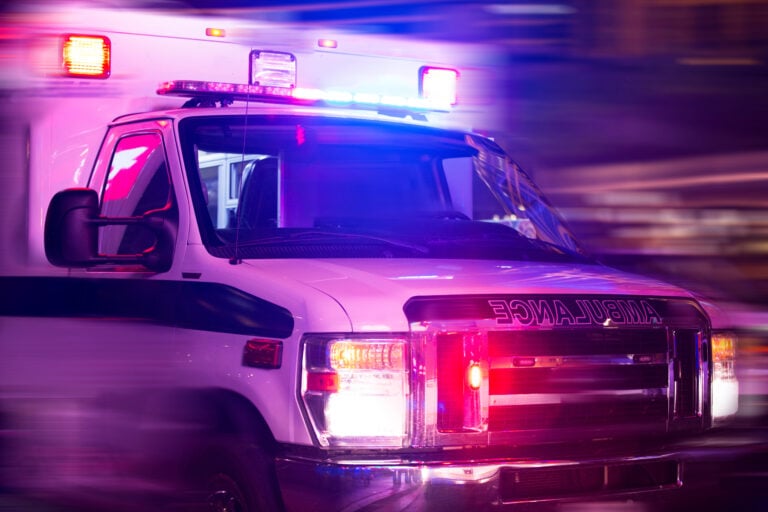
Sources of Recovery in a Car Crash Lawsuit
Holding Every Possible Party Responsible in Your Claim.
Are bills piling up after your crash? Our goal is to gather enough evidence to establish a claim and maximize a recovery that will fully compensate the injured party. Tittle & Perlmuter’s car wreck attorneys will also aggressively negotiate with insurance companies. And, if needed, we will skillfully represent our clients in the courtroom. We will explore all legal options, such as what insurance policies may be helpful. This includes the investigation of potential sources of recovery, which includes the following:
- The at-fault driver’s liability coverage;
- Whether any uninsured or underinsured motor vehicle coverage is applicable;
- Whether medical payment coverage is applicable.
Each accident is different. We stress that the injured party should not speak with the insurance company unless you have talked to a reputable car accident attorney first. You may say something that will cost you an opportunity to make a fair recovery after your car crash.
At Tittle & Perlmuter, we will conduct a comprehensive evaluation of your case to determine the full extent of your harms and losses. We can also carefully resolve any healthcare, workers’ compensation or other liens that may be attached to your recovery after an auto accident. We want you to focus on one thing, your recovery. Life after a car accident is confusing and overwhelming. Let us handle the details.
When Successful, How Much Will an Ohio Car Accident Lawyer Recover for Me?
Leaving No Stone Unturned when Negotiating Your Claim.
Once your attorney has all of the information from your accident, such as medical records, bills, and lost wage information, then our car accident attorneys can decide how much your case is worth and start negotiating settlements with the insurance company. The compensation a victim of a car accident can receive includes covering expenses for:
- Vehicle repair or replacement
- Medical bills
- Lost income
- Punitive damages, under certain circumstances
- Emotional distress
- Pain and suffering
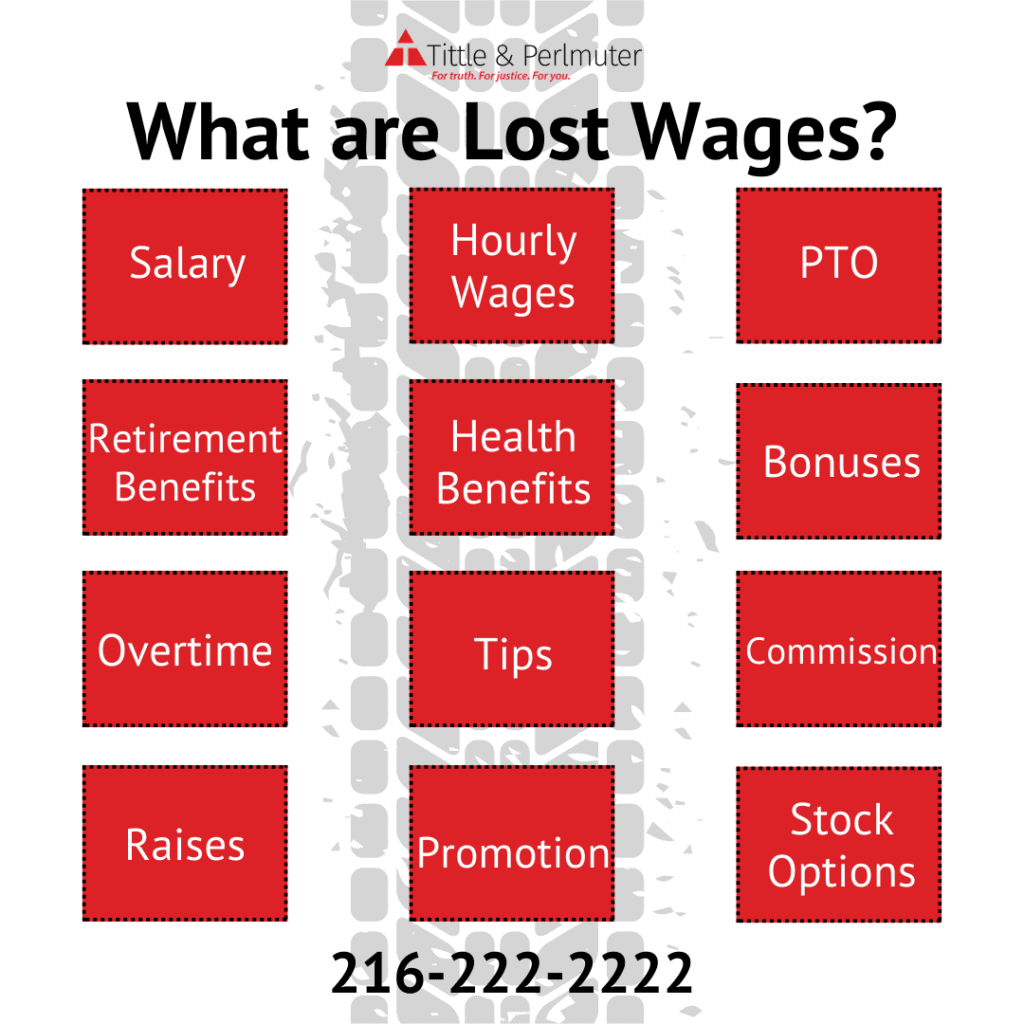
In the event that a loved one died as a result of a negligent driver and you file a wrongful death lawsuit, compensation may also cover the following expenses:
- Costs of a funeral
- Loss of financial support
- Loss of companionship
Common Types and Causes of Car Crashes
Armed with the Right Tools to Fight for Justice.
At Tittle & Perlmuter, our legal team has handled all types of car accident cases, including the following:
- Intersection and rear-end collisions
- Highway and freeway accidents
- Accidents resulting from a failure to obey traffic signs or signals
- Multiple-vehicle accidents or “pileups”
- Truck accidents
- Victims of drunk drivers
- Individuals hurt by distracted drivers, including drivers who were talking on their cell phone or texting while driving
- Those injured by drowsy drivers
- Victims of aggressive drivers, including drivers who did not obey the speed limit
- Injured passengers
- Hit-and-run accidents or hit-and-skip accidents
- Dangerous roadways as a contributing factor
- Victims of careless drivers
- Fatal accidents
The team at Tittle & Perlmuter has handled a variety of auto accident cases. Our Ohio car accident lawyers are armed with the tools to fight for justice for those injured by a negligent driver. However, there is a strict statute of limitations that applies to each car accident case. There is a limited time frame in which victims can settle or file their case, or their claims may be forever barred. In Ohio, the statute of limitations to file a lawsuit for a car wreck case is two years from the date of the crash. If you or a loved one has been injured as a result of a motor vehicle accident, it is vital that you contact a car wreck attorney as soon as possible.
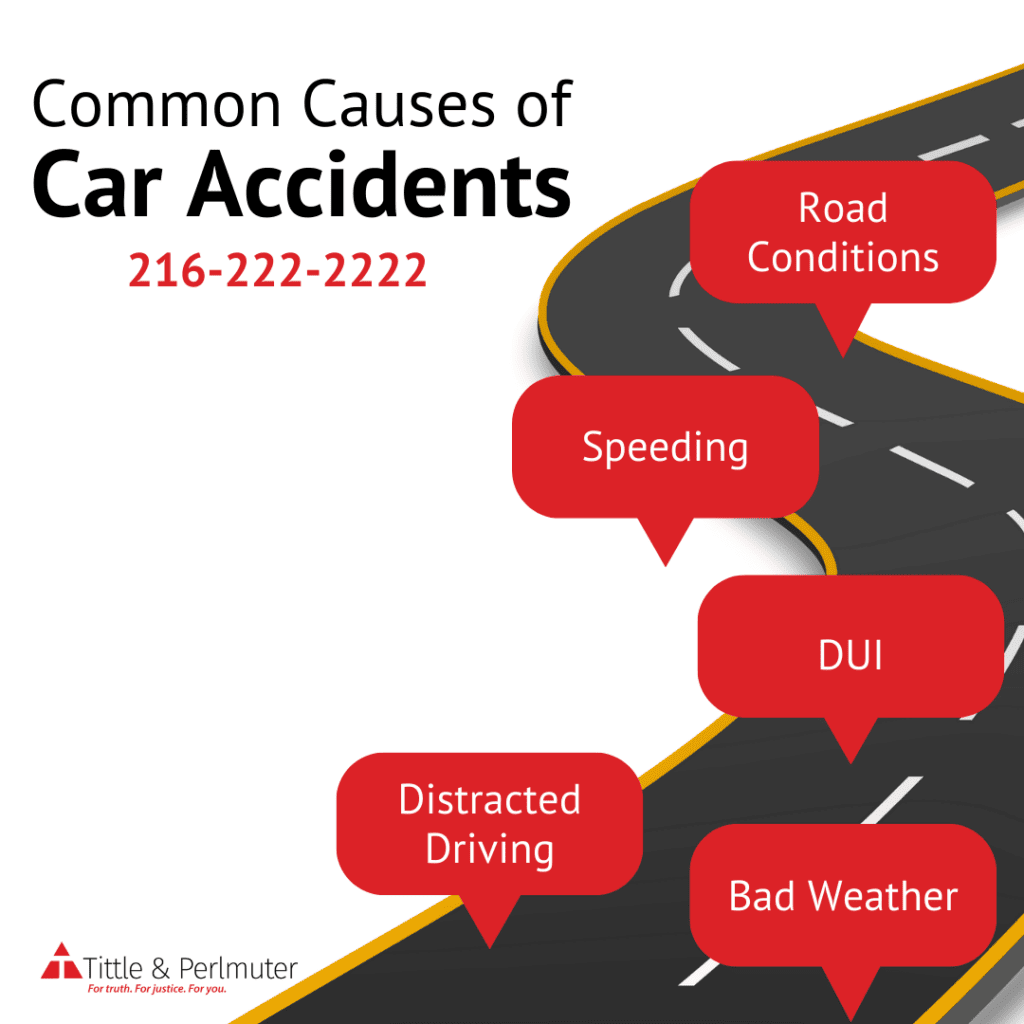
Traffic Crashes in Ohio
Keeping Drivers Safe in the Buckeye State.
Nationwide, there were 6,296,000 motor vehicle crashes with 1,747,166 resulting in injury from two years ago. According to the Ohio Department of Public Safety, there were 305,964 traffic crashes in 2016 in Ohio alone. With this large amount of auto accidents in a year, odds are nearly everyone will be involved in a car accident at some point in their lives. If you need help, our expert motor vehicle accident lawyers can help.
Despite knowing the odds, one cannot prepare oneself for the harsh reality of suffering from an injury as a result of the negligence of others, along with the corresponding pain and chaos. Immediately after an accident, victims must deal with ongoing concerns relating to damage to their vehicle, mounting medical bills, and recovery from their injuries. You can’t control what distracted or careless drivers do on the road. However, you can control your life after a crash. This is where Tittle & Perlmuter steps in. When you or a loved one is injured or killed as a result of a negligent driver, our local car crash attorneys are there to protect your rights and fight for you.
Download Our Free Ohio Car Accident Guide
Whether you are trying to prove fault, figure out the timeline of your case, or figure out if you even need a lawyer- our free guide can help you navigate your Ohio car accident. Our guide will answer questions such as:
Contact a Car Accident Attorney
Turn 2 Tittle & Perlmuter | (216) 222-2222.
While nothing can erase the damage caused by a car accident, a successful car accident lawsuit can help put you in a position financially to mitigate its effects. Don’t hesitate to contact our office directly to see if you have a car accident case we can provide legal representation for. You deserve justice in your passenger in a car accident claim or other type of car accident claim. Hire our team to fight for you, and Get the Guardians on Your Side!
It will cost you nothing to have your car accident claim evaluated. An attorney from our team is ready to hear your story, and see how we can help. You can reach us by phone, fill out our form, or by online chat. We will respond promptly and help you find the next steps in your car accident claim. Schedule a free strategy session and take the first step towards justice, today.
Read More: Recent Car Accident Blogs
Additional Resources to Educate, Equip, and Empower.
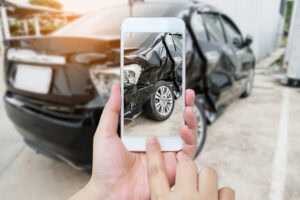
Avoid These 7 Insurance Adjuster Traps After a Car Accident
Here are 7 common traps insurance adjusters use and advice from an Ohio personal injury lawyer on how to avoid them:

Save Your Claim: Why You Should Have a Dash Cam in Your Vehicle
Proving fault in an auto accident can be a complex, and intricate process. But why not make sure you are covered in the case that someone else hits you? That’s where dash cams come in.
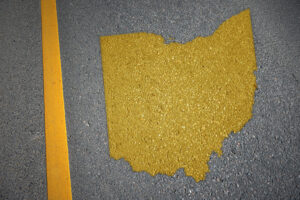
New Technology to Reduce Ohio Highway Crashes
Ohio Governor Mike DeWine and the Ohio Department of Transportation (ODOT) announced a new effort to help reduce and prevent the number of serious crashes

